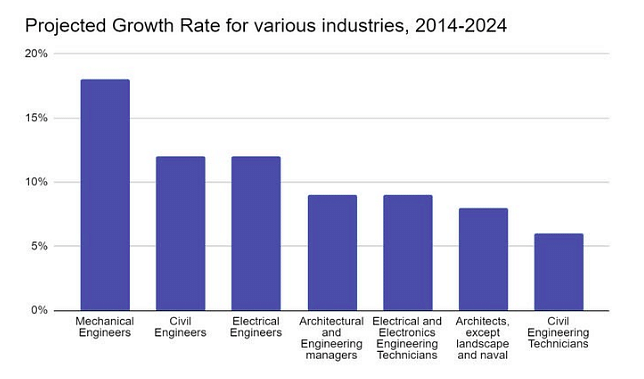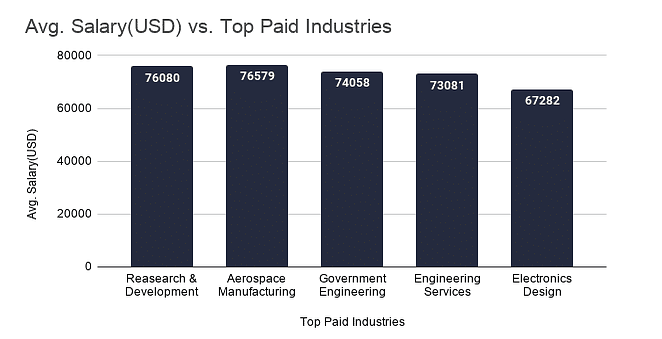
Ahana Bhaduri Senior Content Specialist
Senior Content Specialist
Masters in Mechanical Engineering in Canada is usually a one to two years long program offered by over 20 engineering colleges in Canada. Postgraduate aspirants of Masters in Mechanical Engineering in Canada can complete either a course-based Masters in Engineering (MEng) or research-intensive, thesis /non-thesis based, Masters in Science (MS)/ Masters in Applied Science (MASc) degree. The average tuition fee structure in the Engineering colleges in Canada for mechanical engineering varies between 11,900 to 40,800 USD. Indian students can estimate an equivalent of INR 8.9-30.5 Lakh.
Masters in Mechanical Engineering is a graduate-level engineering degree which concentrates on the application of principles of physics for analysis, design, manufacturing, and maintenance of mechanical systems. It encompasses the learning of machines, materials, energy, manufacturing, automation, biomedical engineering, aerospace, and more.
Three universities offering the program such as University of Toronto, McGill University and the University of British Columbia are ranked across the top 100 universities worldwide. The manufacturing industry in Canada accounts for around 174 billion CAD, which is 10% of Canada's total GDP.
Table of Content
- Top Masters in Mechanical Engineering Colleges in Canada
- Why Study Masters in Mechanical Engineering
- Masters in Mechanical Engineering in Canada: Course Structure
- Masters in Mechanical Engineering in Canada: Admission Process
4.1 Admission Deadlines
4.2 Eligibility
4.3 Documents Required - Masters in Mechanical Engineering in Canada: Costs
5.1 Pre-arrival Cost
5.2 Tuition Fees
5.3 Cost of Living - Masters of Mechanical Engineering in Canada: Scholarships
- Masters of Mechanical Engineering in Canada: Job Prospects
7.1 Career and Salary - Masters of Mechanical Engineering in Canada: FAQs
Top Masters in Mechanical Engineering Colleges in Canada
In order to study Masters in Mechanical Engineering in Canada, students can opt from a variety of colleges who offer the course. Canada has a number of top ranking colleges and Universities offering Masters in Mechanical Engineering degrees.
Among the top-ranking Mechanical Engineering Universities in Canada, some of the top ranking colleges are tabulated below for your reference,
| University | Degree offered/ Course Duration | Annual Fees (in USD) |
|---|---|---|
| University of Toronto | Master of Engineering (1 year) Master of Applied Science (2 years) |
46,129 17,827 |
| McGill University | Master of Engineering (1.5 year) Masters in Science ( 2year) |
13,065 13582 |
| University of British Columbia | Master of Engineering (1 year) Master of Applied Science (2 years) |
15,790 6794 |
| University of Alberta | Master of Engineering (2 years) Master of Science (2 to 2,5 years) |
7875 7100 |
| McMaster University | Master of Applied Science (2 years) | 24,750 |
| University of Waterloo | Master of Engineering (1-2 year) Master of Applied Science (2 years) |
19,851 10,563 |
| Queen’s University at Kingston | Master of Engineering (1 year) Master of Applied Science (2 years) |
14,619 |
| University of Western Ontario | Masters in Engineering(1 year) Masters of Engineering Science(2 years) |
9123 |
| Dalhousie University | Master of Engineering (1-1.5years) Master of Applied Science (2- 2.5 years) |
14,383 |
| University of Ottawa | Masters in Engineering(1 year) Masters of (2 years) |
25,402 20,069 |
Graduate Diploma (GDip) programs and certificate programs in diverse specializations of Mechanical Engineering are also offered by leading Canadian universities apart from the master’s degree. These short-term programs in Canada offer more practical knowledge, are shorter in duration, and cost comparatively less.
Why Masters in Mechanical Engineering from Canada
Some of the top reasons that justify the fact as to why should students pursue Masters in Engineering from Canada are listed below for your reference,
- More than 3,000 mechanical engineers graduate from Canadian universities annually.
- The percentage of job openings in Ontario for mechanical engineers is forecasted to climb 90% in the upcoming 5 years.
- There are around 2100 new job openings expected for mechanical engineering graduates by the year 2025, as per EngineersCanada.
- The salaries offered to engineers in Canada have risen by 10% in the last five years.
- Due to immense opportunities, Canada offers permanent residence to thousands of people across the world.
- Per year, the Canadian government increases the number of applicants to over 280,000. So it is easy for a student to get settled in Canada after completing master's.
Masters in Mechanical Engineering in Canada: Course Structure
Master’s in Mechanical Engineering is an interdisciplinary study involving the design and redesign of mechanical and thermal devices using analysis and computer-aided design. The core areas of the program are materials, solid mechanics, design, and thermofluids.
Although Mechanical Engineering has specific course requirements, students can customize their course of study based on the area of technical emphasis chosen. Some of the common courses offered by leading universities are as follows:
- Biomedical Engineering
- Mechatronics and Manufacturing Engineering
- Energy and Environment
- Solid Mechanics
- Advanced Materials Manufacturing
- Field Design
- Energy and Thermofluids Engineering
Available as mainstream as well as a specialization program, the popularly opted specializations of the master's degree include Mechatronics, Industrial engineering, Nanotechnology, Materials Engineering, Nuclear Engineering, Aerospace, and Manufacturing Engineering.
Masters in Mechanical Engineering in Canada: Admission Process
The basic procedure of admissions for studying in Canada is similar across top universities in Canada. The deadlines, requirements, and eligibility criteria for international students planning to pursue mechanical engineering are discussed below.
Admission Deadlines
Following are the application deadlines for admission to various colleges in Canada with master’s in Mechanical Engineering:
| University | Application Deadlines |
|---|---|
| McGill University | Fall: January 15, Winter: August 1 |
| McMaster University | February 28. |
| University of Toronto | Fall: April 1, Winter: August 1 |
| University of British Columbia | March 1. |
| University of Alberta | Fall: April 1, Winter: October 1 |
| Queen’s University at Kingston | No deadline, applying before March 1 increases chances for internal awards. |
| University of Waterloo | Fall: February 1, Winter: June 1, Spring: October 1 |
| University of Western Ontario | Fall Term: February 1. |
| University of Ottawa | Fall: March 1, Winter: August 1 |
| Dalhousie University | September: April 1, January: August 31, May: December 31 |
Eligibility
The following list of eligibility requirements needs to be fulfilled in order to pursue Masters in Mechanical Engineering in Canada,
- Applicants must have a minimum educational background of 16 years which mandates a break up of 10+2+4, proof of which is mandatory.
- A 4 years bachelor’s degree in the same field or equivalent from a recognized college or university.
- A preference is given to students with a mechanical engineering bachelor's degree.
- Minimum GPA of 3.0 on a 4.0 scale (~83-86%) in the final two years of undergraduate study.
- The percentile equivalent is 73-76%.
- The grade equivalent is B. Some universities may ask for a grade of B+ while admissions.
- Prior work experience in a related field enumerates an advantage to secure an admission.
- Standardized test scores may be required for admission to certain universities in Canada.
- International applicants should meet the minimum test scores in IELTS, TOEFL or other tests specified by the university to demonstrate proficiency in the English language.
| University | TOEFL | IELTS | Others |
|---|---|---|---|
| University of Toronto | iBT:93 | 7 | COPE:76 |
| McGill University | iBT:92 | 7 | NA |
| University of British Columbia | iBT:93 | 6.5 | NA |
| University of Alberta | iBT:95 PBT:580 | 6.5 | CAEL:60 PTE Academic:59; MELAB:85 |
| McMaster University | PBT:550 CBT:213; iBT:88 | 6.5 | MELAB:85 |
| University of Waterloo | iBT:90 | 7 | MELAB:85; CAEL:70 PTE Academic:63 |
| Queen’s University at Kingston | iBT:88 | 7 | MELAB:80; PTE Academic:65 |
Documents Required
The list of important documents that are essential for enrolment across any of the top Colleges offering Masters in Mechanical Engineering are listed below for your reference,
- Official transcripts from all post-secondary institutions previously attended
- Updated Curriculum Vitae (CV)
- University specified Statement of Purpose/personal essay to highlight the reasons for applying for the program, career goals, academic background, and other relevant details
- Three letters of recommendation/ reference reports acknowledging the details of academic and professional achievements.
- GRE test scores are optional. However, it is recommended by a few universities.
- International students need to submit the proof of the English Language Proficiency (ELP) exam results in fulfilling the minimum score requirements to demonstrate their proficiency in the English language.
- The university’s School of Graduate Studies accepts test scores sent electronically from the testing center for TOEFL, IELTS, and PTE Academic.
Check out: How to get a Canadian Student Permit
Admission Decision for Masters in Mechanical Engineering in Canada: More than 2 lakhs of applicants submit their application forms for masters in Mechanical Engineering in Canada across universities. The applicants must go through some rigorous procedures to be selected. The admission eligibility is also subject to high academic standing with proficiency in engineering skills like analysis, design, problem-solving and math skills. The admission decisions are usually delivered within eight to ten weeks following the application deadline.
Masters in Mechanical Engineering in Canada: Costs
International students have to make a feasible plan for studying master's in Mechanical Engineering in Canada. The entire cost of the study can be divided into three sections. The pre-arrival cost, cost of study and cost of living (housing, food, miscellaneous) are the three defined cost structures.
Pre-arrival Cost
The cost of the exams required to study in Canada, cost of travel, health insurance, and others are a part of your pre-arrival expenses. The details of the same are given below:
| Type of Expense | Cost (USD) |
|---|---|
| Application fees | 115-220 |
| Canadian Study Permit Application fees | 235 |
| Health Insurance | 10,000 |
| IELTS fees | 185-190 |
| TOEFL fees | 160-250 |
| GRE fees | 205-230 |
| GMAT fees | 250 |
| Airfare | 450-1400 |
| Total | 12775 |
Tuition Fees
The tuition fees for pursuing the program from top Canadian universities ranges from 9000 USD to 50,000 USD annually. The cost of an Indian student will range from INR 6Lac to 37 Lac. Though the cost may appear to be a large sum, when planning to pursue a master's degree in Canada, you can always look for scholarships options. To find out more about scholarships available to study master's courses in Canada, click here.
Cost of Living
While pursuing your master's in Canada, the expenses that you will encounter while living in Canada include the cost of accommodation, food & beverage, books, and material, etc. Accommodation costs may vary depending on the type of logging. A basic comparison of the costs of accommodation in Canada for students is given below:
- Rented Room- 308 to 616 USD
- Apartment (large city)- 693 to 1540 USD
- Apartment (small city)- 693 to 2310 USD
You may experience an expense of around 750-1510 USD on books and material. Food and beverages may cost you around 3000-4000 USD.
Masters in Mechanical Engineering in Canada: Scholarships
Masters in Mechanical Engineering in Canada can be an expensive affair. You can apply for the following scholarships for international students in Canada. Some of the university-specific scholarships offered to international applicants pursuing engineering degrees are listed below:
| University | Scholarship | Details |
|---|---|---|
| University of Toronto (U of T) | Graduate student Funding for MASc; Faculty of Applied Science & Engineering Admission Scholarships; U of T Engineering International Scholarships |
12156 USD/year for 2 years; Maximum 3799 USD/year; Variable to a maximum of 15196 USD x 4 years |
| McGill university | McGill Engineering International Tuition Award | 20,330 USD |
| University of British Columbia | Affiliated Fellowship Masters Program; Gartshore Fellowship |
Fellowship values range from 132 USD to 12,000USD; 11,500 USD for MASc students entering the MASc program in Mechanical Engineering |
| McMaster University | Merit-based scholarship; Ontario Graduate Scholarship |
23,800 USD; 3,800 USD/session |
| University of Waterloo | Ontario Graduate Scholarship | 3,800 USD/session |
| University of Ottawa | Bursary for Masters degree with a thesis; Bursary for Masters degree with research paper/course option: |
3600 USD; 600 USD for the first six terms of full-time enrolment; 1836 USD; 912 USD for the first three terms of full-time enrolment |
Masters in Mechanical Engineering in Canada: Job Prospects
Canada is the land of opportunities for engineers. Jobs in Canada for mechanical engineers are constantly growing across the provinces. Given below is a graph representing the growth of the engineering industry from 2014 to 2024.

Careers and Salaries
Like other countries, Canada invests its finance for research developmental studies. Mechanical Engineering is such a field where the employees get opportunities to explore the research field. Aerospace Manufacturing has become the second most important industry for the new graduates in mechanical engineering from Canada.

The emerging career outcomes of a Mechanical Engineering postgraduate in Canada and their prospective salaries are as tabulated below for your reference,
| Profession | Average Annual Salary (USD) |
|---|---|
| Mechanical Estimator | 61200 |
| Project Engineer | 56250 |
| Mechanical Design Engineer | 49700 |
| Manufacturing Engineer | 53600 |
| Associate Engineer | 73,919 |
| Mechanical Maintenance Supervisor | 53,500 |
| Mechanical Engineer Manager | 114,446 |
| Mechatronics Engineer | 87,010 |
| Mining Engineer | 83,875 |
A master’s program in Mechanical Engineering equips students with the principles and latest knowledge to handle both the mechanical and industrial sectors. Mechanical Engineers remain one of the most in-demand jobs in Canada next to electrical engineers. From 2016 to 2026, the employment of mechanical engineers is projected to grow 9 percent. The steady resource rebound in the future will claim a steady demand for mechanical engineers in the western and resource dominant provinces. From 2020 to 2025, the in-migration for mechanical engineers will be higher in Ontario, Alberta and British Columbia.
Masters in Mechanical Engineering in Canada: FAQs
Ques. Which university is best for mechanical engineering in Canada?
Ans. Masters in mechanical engineering is offered in 19 universities of Canada. Some of the popular ones are University of Toronto, McGill University, University of British Columbia, University of Alberta, McMaster University and University of Waterloo.
Ques. Is Canada a good place to do masters in mechanical engineering?
Ans. Over 3,000 mechanical engineers graduate from universities of Canada per year. This implies that job opportunities are immense in this field in Canada. Also, the program is offered by some of the renowned universities such as U of T and UBC. Thus, it is safe to say that Canada is a fairly good place for pursuing masters in mechanical engineering.
Ques. What are the eligibility criteria for doing MS in Mechanical Engineering in Canada?
Ans. A 4-year bachelors degree in relevant field with a minimum 3.0 GPA in the final two years of study is required to get admission in MS in Mechanical Engineering in Canada.
Ques. How much does it cost to study masters in mechanical engineering in Canada?
Ans. The total program fee of MS in Mechanical Engineering in Canada ranges between 7,000 USD to 52,000 USD. Living cost for an international student in Canada is approximately 12,000 USD per annum.
Ques. What are the job opportunities after a masters in Canada in mechanical engineering?
Ans. After completion of masters in mechanical engineering from Canada, students can work as Mechanical Estimator, Project Engineer, Mechanical Design Engineer, Manufacturing Engineering, etc. The average salary of a mechanical engineer in Canada is around 50,000 USD per annum.
















1606454348.png?tr=w-305,h-145,c-force?tr=h-175,w-350,c-force)

1607424314.png?tr=w-305,h-145,c-force?tr=h-175,w-350,c-force)





Comments